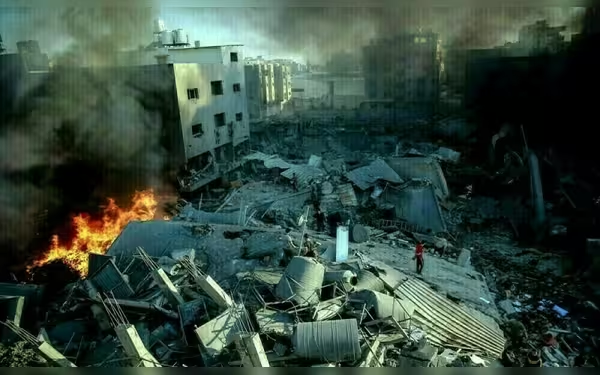Saturday, December 21, 2024 05:09 PM
Israeli Airstrikes in Gaza Kill 15 Amid Escalating Conflict
- Israeli airstrikes in northern Gaza kill at least 15.
- Humanitarian crisis worsens as hospitals are overwhelmed.
- Displaced families face danger from ongoing bombardments.
 Image Credits: brecorder
Image Credits: brecorderIsraeli airstrikes in northern Gaza have killed 15, exacerbating the humanitarian crisis as hospitals struggle to cope with the influx of casualties.
In recent days, the situation in Gaza has escalated dramatically, with Israeli forces intensifying their military operations in the northern region. The ongoing conflict has led to devastating consequences for the local population, particularly in areas like Beit Lahiya, Jabalia, and Beit Hanoun. Reports indicate that overnight airstrikes have resulted in the deaths of at least 15 individuals, with many more injured and unaccounted for. This tragic event highlights the dire humanitarian crisis unfolding in the region.
According to Palestinian medics, the airstrikes targeted homes, including one that was providing shelter to displaced families. Rescue workers faced significant challenges in reaching the affected areas due to the ongoing bombardments. The three hospitals in the vicinity, which are already struggling to operate, have been overwhelmed by the influx of wounded individuals. Eyewitness accounts describe clusters of houses being bombed and set ablaze, further exacerbating the already critical situation.
Residents have reported that Israeli drones dropped bombs near a school that was sheltering displaced families, raising concerns that these actions are intended to intimidate the population into fleeing. The Palestinian authorities allege that the Israeli military is attempting to clear the northern part of Gaza through forced evacuations and relentless bombardments, aiming to establish a buffer zone. However, the Israeli army has denied these claims, maintaining that their operations are necessary for security reasons.
The scale of the devastation is staggering, with Gaza officials estimating that more than 44,400 people have lost their lives since the onset of the conflict. The majority of the population has been displaced, and vast areas of the enclave lie in ruins. While Israel recently agreed to a ceasefire with Hezbollah, the violence in Gaza continues unabated.
In an effort to address the post-war governance of Gaza, Egyptian officials have facilitated discussions between Hamas and the rival Fatah group, led by Palestinian President Mahmoud Abbas. Egypt has proposed the formation of a non-partisan committee to oversee Gaza's administration once the conflict concludes. However, Israel has expressed that Hamas should not play any role in governance, complicating the negotiations.
Despite some indications of progress in the talks, no final agreement has been reached. An official close to the discussions noted that Israel's approval would be crucial for the committee's effectiveness. Additionally, Egyptian security officials are engaged in talks with Hamas to explore potential ceasefire options. A Palestinian official involved in the mediation efforts stated that Hamas remains firm on its condition for a ceasefire, which includes an end to the war and the withdrawal of Israeli troops.
As the situation continues to unfold, Israeli Foreign Minister Gideon Saar mentioned that there are signs of progress towards a hostage deal, although Israel's conditions for ending the conflict remain unchanged. Meanwhile, White House national security advisor Jake Sullivan expressed optimism that the chances of a ceasefire and a hostage agreement are becoming more likely.
The ongoing conflict in Gaza serves as a stark reminder of the human cost of war. As families are torn apart and communities are devastated, the international community watches closely, hoping for a resolution that brings lasting peace and stability to the region. The path forward remains fraught with challenges, but the need for dialogue and understanding has never been more critical.













